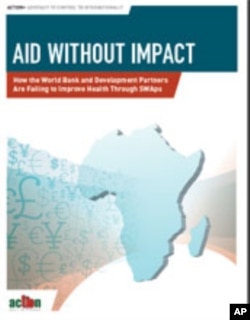A new report says despite investing billions of dollars in health care, the World Bank and other development agencies have fallen short of their goals.
The report – Aid Without Impact – was released Wednesday by partnership of groups called ACTION or Advocacy to Control Tuberculosis Internationally. The report examines – what are called – sector-wide approaches (SWAps) to health programs in sub-Saharan Africa.
Paul Jensen, ACTION’s global research coordinator, says the main criticism is that the World Bank and other development partners have invested billions of dollars over more than a decade in a sector wide approach to health care “that by and large isn’t improving people’s health.”
He says, “When you go back to the mid 90s, when this approach was conceived, it was really conceived as a way to improve results on the ground. This was meant as a way to improve the way that aid was delivered for health…. And over the course of a decade… we find that it’s really not associated…with improvements in health outcomes looking specifically at sub-Saharan Africa.”
What’s gone wrong?
A sector wide approach, for example, may call for donors to pool their money to support a single policy or program, often with local governments taking the lead.
“It’s meant to improve or build or strengthen a health care system systemically. And it’s meant to finance the delivery of a wide range of interventions. It’s really meant to align the donors and a country around one program of work, like a national health plan,” says Jensen.
He says overall the idea behind it is sound. But he adds, “There’s nothing wrong in terms of the concept. It looks great on paper. But when we reviewed the literature and when we analyzed the program ocuments…and talked to people who are knowledgeable, we find that the way that they’re implemented is not associated with improvements with health outcomes.”
The report says implementation of the sector wide approach places a lot of emphasis on coordination. “And what’s lost,” says Jensen, “is that fact that SWAps are a means to an end. And what they’re doing is confusing process with substance…and really confusing means with ends.”
The ACTION report blames part of the problem on a failure to set priorities.
“One of the main criticisms that we have is that there’s actually been very little resources going to robust external evaluations of these SWAps to make sure that they’re working,” he says.
Recommendations
The World Bank is asking donors this year to continue or increase funding for many sector-wide programs.
“The funding that comes from governments needs to be hinged to demands for improvements in performance in the way that the Bank does business in health in sub-Saharan Africa,” he says.
However, he says other donors need to do the same “because SWAp is inherently a multi-donor animal…. We want these programs to be independently evaluated at least every two years.”
He also calls for the “management structure within these institutions to be contingent on improvements in performance, in the sense that incentives are provided for management to do better.”
The report states: The findings of a World Bank Independent Evaluation Group (IEG) evaluation of SWAps in the health sector were consistent with this review’s findings, identifying major flaws in the approach the Bank and its development partners are taking to SWAps. These flaws included, among others:
• A general lack of attention to results
• Insufficient attention to ensuring that SWAps are technically sound
• A general failure to monitor country expenditures to be sure they focus on the highest-priority investments
• Very weak monitoring and evaluation of the health programs that SWAps are supporting
The report adds that one of the key areas where the sector wide approach has not achieved the desired results is in TB control.
World Bank rejects findings
The World Bank striongly disagrees with the ACTION report findings. Phil Hay, an adviser to the World Bank's Human Development Network spoke to VOA to dispute the report. Click below to listen.
Also, in a statement, the World Bank says, "The World Bank agrees that tuberculosis is a very serious health problem but considers this new report by the group Action as unfortunately a one-dimensional report that confuses the way that SWAps operate on the ground in Africa."
It says, "TB is a major health problem in the lives of people in Africa and elsewhere. SWAps, however, are large health programs that involve many different donors pooling their money and technical help in the one basket to achieve overall health outcomes.
"Large number of different partners are involved in Africa SWAps. In most cases, the Bank provides a relatively small share of the financing—usually less than 20 percent—with many other donors contributing. With so many donors and partners involved, it is clear that the World Bank cannot be singled out when it comes to discussions on health Swaps in Africa."
The majority of World Bank Africa health operations, it says, do not involve SWAps, adding Africa has 50 ongoing health operations, "of which less than 10 percent support SWAps."
The Bank says, "Our country clients in Africa and other regions continue to look to the Bank for its financing and strategic guidance and leadership, especially during the recent food and fuel emergencies and the continuing economic crisis."
It estimates by the end of the current fiscal year, the Bank will have provided over $4 billion for better health, nutrition, and population over the last twelve months.










